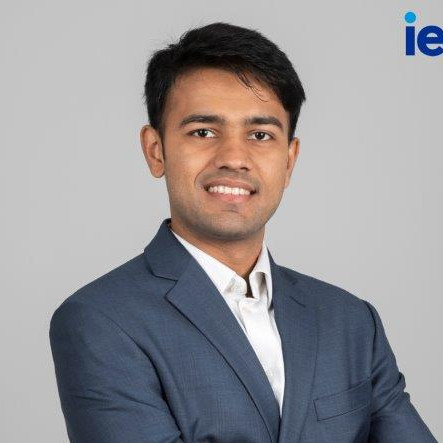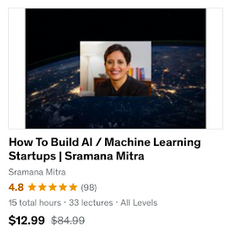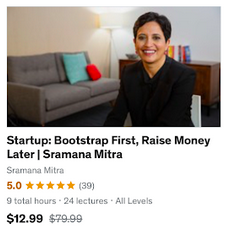1Mby1M Virtual Accelerator Investor Forum: With Janam Mehta, Partner of Campus Fund and Venture Investments at JSW Ventures (Part 3)
Sramana Mitra: Tell us about Campus Fund and JSW Ventures.
Janam Mehta: JSW Ventures is a $40 million fund. We’re largely Series A focused. We do up to $2 million in the first check and around $4 million throughout the life of an investment. We are largely SaaS and platform focused covering enterprise health, consumer, finance, and agricultural industries. We are not a corporate venture capital. JSW is an anchor LP in the fund, but we’ve raised institutional capital. 20% to 30% comes from the general family of the JSW group. They are the largest steel manufacturers in India. They’re increasingly getting into different industries.
>>>Featured Videos
1Mby1M Virtual Accelerator Investor Forum: With Evan Zimmerman, Chairman of Jovono (Part 3)
Sramana Mitra: Let’s do another example. You’re doing a very good job of illustrating what attracts you. Keep going. Let’s do a couple of examples.
Evan Zimmerman: Zeekit is another company we invested in. We led the Series A with some friends of ours. We co-led their Series A which was their last round of investment before they sold to Walmart for over $200 million. They had a SaaS business that was growing quickly and had a number of really prominent customers.
>>>Apple Doesn’t Fear Economic Uncertainty

Earlier last week, Apple (Nasdaq: AAPL) announced its third-quarter results that surpassed market expectations but showed a slowdown in growth for the company.
>>>Video FAQs
Can 1M/1M Help Me Raise Money?
How Does 1M/1M Democratize Entrepreneurship Education?
How Does 1M/1M Democratize Management Consulting?
When Is The Right Time To Join 1M/1M?
Can 1M/1M Help Me With Business Development?
Can 1M/1M Help Me With Market Sizing?
Can 1M/1M Help Me Validate My Product?
Will I Have Private 1-on-1 Sessions In 1M/1M?
How Does 1M/1M Help Entrepreneurs Connect With Silicon Valley?
Mentoring or Consulting?
Why Does 1M/1M Charge $1000 a Year?
Why Does 1M/1M Partner With Local Organizations?
Why Don\’t Mentoring Networks Work?
Why Is It Important To Study With 1M/1M Now?
Dan Stewart Story
Vikrant Mathur Story
1Mby1M Virtual Accelerator Investor Forum: With Janam Mehta, Partner of Campus Fund and Venture Investments at JSW Ventures (Part 2)
Sramana Mitra: The other trend that is equally interesting are companies that are being built in India facing the Indian market. The FinTech sector is a really interesting sector. The health tech sector is really interesting. The EdTech is really interesting. They are crowded, but that is bound to happen in a booming market. With time, it will become clear which ones make it.
Of course, there is a unicorn mania going on. There is a lot of excessive funding. I don’t believe that just the ones that are going to get the maximum amount of funding are going to be the ones that are going to win those spaces. They have an advantage which is a capital advantage. They also have a disadvantage of not having the discipline in how to manage cash. We’ll see how all that plays out. Right now, there’s a correction going on. The bottom line is, there is movement.
>>>1Mby1M Virtual Accelerator Investor Forum: With Evan Zimmerman, Chairman of Jovono (Part 2)
Sramana Mitra: What is the geography focus?
Evan Zimmerman: We mostly invest in the US but we actually have done a number of deals outside. The people who invest in the US primarily do so for a few reasons. For some people, it’s because they don’t feel that they can understand the local market. There are also some logistical and legal considerations. We’ve done a number of deals in Israel and UK. You’re seeing a lot more funds going to Latin America, but we haven’t done a deal yet.
>>>Cloud Stocks: Microsoft’s Momentum in Commercial and Cloud Keeps it Steady

Last week, Microsoft (NASDAQ: MSFT) reported results for its fourth quarter which missed analyst estimates. This was its slowest quarterly growth since 2020 as worsening foreign exchange rates and weakness in PC demand and advertising spending took a toll. However, it provided a resilient outlook of double digit growth for FY23 based on sustained momentum in its cloud business.
>>>1Mby1M Virtual Accelerator Investor Forum: With Janam Mehta, Partner of Campus Fund and Venture Investments at JSW Ventures (Part 1)

Janam Mehta, Partner at Campus Fund and Venture Investments at JSW Ventures, discusses the progress of the Indian startup ecosystem.
Sramana Mitra: Tell us about a bit of your background as well as what are you up to with the investments.
>>>Popular Udemy – 1Mby1M Tech Startup Courses For Sale in August

Our popular Udemy-1Mby1M Tech Startup Courses will be on sale through August! Learn how to put one step before the other on your entrepreneurial journey. Whether you are just starting your entrepreneurship education or interested in startups raising venture capital, we have startup strategies and mentoring advice from successful founders and investors to share with you.
These courses are available throughout the month of August for $12.99 each. Discount coupons for our most popular courses listed below will be automatically applied when you click on the courses to BUY NOW!




